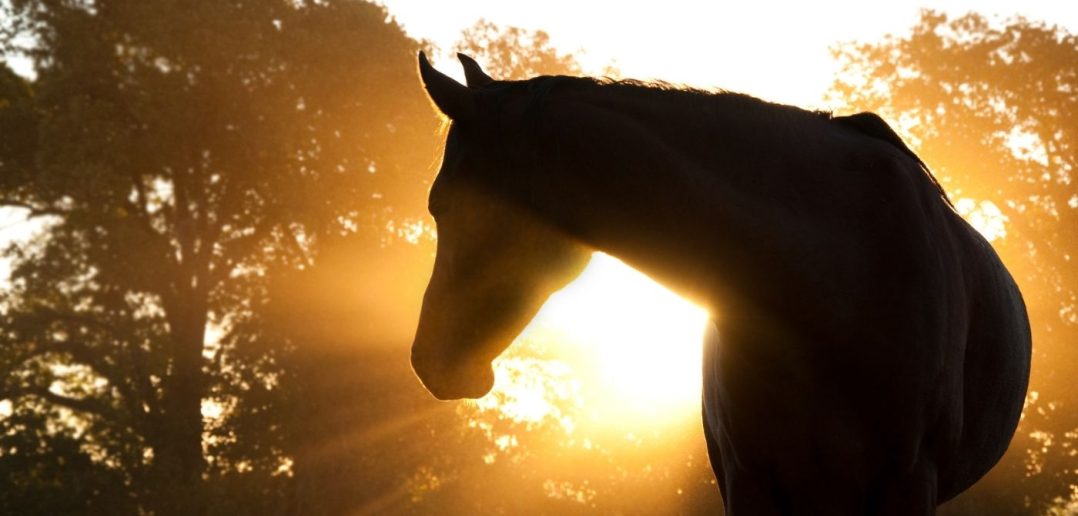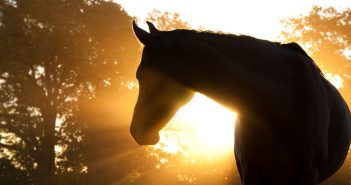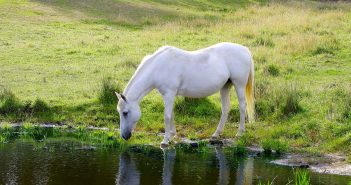Compared to a dog or a cat, horses require a much bigger investment both in terms of space and budget. While it’s definitely more exciting to think of saddles and bridles, riding, and spending beautiful afternoons grooming your pasture pet, the truth is that you’ll also be spending a great deal of time procuring hay and grains, mucking stalls, cleaning horse troughs, checking fence lines, and maintaining pastures (unless you board your horse, in which case you’ll be paying someone else to do take care of all of those glamourous chores).
Whether you keep your horse (or horses) in your own space or board them somewhere, it’s important to learn the normal patterns and behaviors of your horse so you can recognize when there’s a problem. If you board, you’ll have additional horse folks who may also be able to recognize when something is amiss (though it’s totally your responsibility to know your horse and take care of any issues that arise).
Staying on top of preventive measures (like regular worming, vet and farrier visits, vaccines, and grooming), even the most seasoned horse owner is likely to run across concerns that can arise regardless of the quality of care.
Here are five common health problems that horses sometimes face:
1. Colic
Colic is a general term for abdominal pain and is one of the most common emergency situations horse owners encounter. As such, learning to watch your horse’s general behavior and recognize signs of colic is important. Sometimes horses like to roll around on the ground, particularly after a good grooming or a bath, but if your horse has a lack of appetite and is laying down and rolling more than usual, watch closely. Pawing at the ground, nipping at his stomach, standing at rest in an unusual stance are all additional signs to watch for. If you suspect colic, call your vet for a visit and then get halter and a lead and cautiously try to keep your horse walking gently around while you wait. There are a lot of causes of colic including moldy hay or feed, an abrupt change of food, not enough forage, lack of water consumption, stress, parasites, etc. Speak with your vet (an boarding management if you board your horse) to try to figure out what changes can help lessen the chances of these problems in the future. Always be sure to check your horse’s hay for any signs of mold and be sure to have clean, fresh water available at all times.
2. Allergies
Allergies are another common health problem that horses face. Just like humans, horses can be allergic to a variety of things in the air, in food, and in the environment in general. Skin irritations often produce hives (urticaria) which looks like a rash of sorts and quite often goes away on its own. Respiratory allergies, an allergic reaction to inhaling particles, can be often be mitigated by more time fresh air and soaking hay prior to giving it. However, if your horse seems to have trouble breathing all the time and there are no real apparent causes, it might be recurrent airway obstruction, also known as heaves (see a detailed look at heaves for horses).
3. Mud Fever
Mud fever is associated with wet, muddy conditions, though mud isn’t a requirement and a fever isn’t a common symptom. A horse’s prolonged exposure to moisture can cause skin issues. When it affects the pastern, the little area on the bottom of a horse’s leg between the fetlock and the top of the hoof, it’s called pastern dermatitis. Constant moisture is never a good thing for equine skin and problems can actually happen anywhere on the body, though pastern issues are sometimes more difficult to treat. Some horse owners use the phrase mud fever to cover any dermatophilosis (skin infections caused by dermatophilus congeolensis) including rain rot or rain scald. If you discover bumpy skin and crusty scabs that peel (including little clumps of hair in the mix), you’ve seen it. Luckily, cleaning and keeping the area as dry as possible to air out the lesions typically works wonders. However, if the condition doesn’t go away after a week or so you’ll definitely want to involve your vet before you’re dealing with any secondary infections.
4. Equine Ulcers
Ideally, horses should spend about 10-17 hours grazing a large pasture each day. They’re naturally meant gently wander around with a constant food supply in their small stomachs which are producing acid all day, every day, to keep the food breaking down and moving through their delicate digestive system. Horses that aren’t roaming, aren’t given access to hay at will, and are fed twice a day sometimes get a type of acid reflux that could eventually lead to the acidity burning their sensitive stomachs, creating ulcers. The pain of an ulcer tends to decrease their appetite even more, which just exacerbates the problem. An ulcer has to be diagnosed by a vet, but if you suspect your four-legged friend might be suffering from such a pain, increase turnout time in the pasture and be sure there’s plenty of fresh water. You’ll also want to lessen any exercise and stress. (Exercise increases gastric acid production and decreases blood flow to the GI tract.)
5. Back Problems
Most of the time back problems can be traced to ill-fitting tack, which is why it’s essential to make sure your saddle fits you and your horse properly. Normal movement, like rolling around, can also sometimes cause an issue. Just like people, horses can also get back problems as a result of a fall or by twisting/turning/jumping awkwardly. And sometimes a back problem is just an indication of another problems entirely. Back pain really can result from a long list of possible problems, but if your horse is flinching when you’re grooming his back or seems annoyed when you ride, be sure to call your vet and get some help figuring out what might be happening.
Horse problems can sometimes be hard to diagnose, and it’s even more difficult to find the root problem. Have your vet come out to take a look at what you’re seeing and treat your horse accordingly. Most large animal vets are great at giving you all kinds of very specific advice. You might want to also walk around your property so you can fix any environmental issues that could be causing problems. If you board your horse, be sure to speak to management to let them know what’s going on and get their help, too. If the root causes of your horse’s troubles aren’t fixed, your horse could quickly get sick again. Just like for people, prevention is the best way to preserve health.




